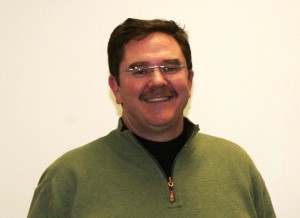
Dean Clark was recently elected as a fellow in the American Association for the Advancement of Science -- a highly distinguished honor. Drue Sokol, Photography Editor
Robert L. Clark, Dean of the Hajim School of Engineering and Applied Sciences and Professor of Mechanical Engineering, is an ambassador to miniscule worlds.
“Most of my research has dealt with things that I couldn’t see,” he explained.
Despite the miniature nature of the topics of his research, Clark has had a very vast and accomplished career — one that reached another peak as of late when he was elected as a fellow in the American Association for the Advancement of Science (AAAS).
AAAS, whose headquarters are based out of Washington, D.C., is an international organization which promotes science worldwide, abiding by its mission to “advance science, engineering and innovation throughout the world for the benefit of all people” through its various roles of “educator, leader, spokesperson and professional association,” according to its website. It also publishes Science, a leading journal in the field.
Fellows are elected for their contributions to the advancement of science or its applications. Clark was selected because of his research in dynamic systems and controls and acoustics — essentially minimizing the sound off of vibrating structures, such as reducing the underwater noise that comes from submarines for the Navy — as well as, in the last ten years, the development of new instruments to manipulate single molecules (nanoscience and nanoengineered materials).
Before he became a fellow, Clark was a member of AAAS because of a subscription to Science, although he has been published in journals over 130 times and has won numerous other prestigious awards.
Joining this fellowship is a very celebrated accomplishment. Potential fellows are nominated by current fellows or by memberes of the association and are subsequently reviewed by a steering group, which then pass on the lucky few that have made it through to the AAAS Council for a determining vote.
This year, 503 fellows were elected into the association in a wide range of disciplines. It is an honor for anyone to receive this award, but John Lombropoulous, also a professor of mechanical engineering, believes that there is an added benefit for Clark.
“I think it’s distinguished for [Clark] especially, because he’s young,” he noted. Lombropoulous went on to explain that because of the young age at which Clark has earned this honor, he will be able to continue to reap its benefits much further into his future career than if he had been elected at the tail end of his employment.
Clark himself is nothing but appreciative of the acknowledgement. “It’s an honor,” he said. “It’s a nice recognition for the work and contributions that you make.”
Lombropoulous confirmed the first-rate quality of Clark’s election. “You don’t always realize that the people you see in the cafeteria can be as distinguished as the people you read about in the newspaper,” he said.
And Clark will definitely be recognized — he received a formal invitation to the annual meeting of AAAS in Washington D.C. on Feb. 19 to be honored at a special ceremony. Although he will be unable to attend the ceremony, he has notified AAAS and will instead receive his certificate through the mail.
While this is certainly an incredible achievement for Clark, it means good things for the UR as well.
“[It] reflects greatly on the school as a whole,” Clark said. “[It’s] a representation of the quality of research you expect at a major research institution.”
He also suggested that honors and awards of this magnitude will attract prospective students to the school. Lombropoulous zeroed in on the mechanical engineering department in particular.
“It will benefit [the department] by drawing good, positive attention to [it],” he said, emphasizing the fact that it is a small department that has, as of now, two fellows in its midst, the other being Professor John Thomas, who was elected two years ago.
Clark’s research though, it seems, will also go beyond the walls of the UR and affect the world as a whole. “I think that we all approach our research with the belief that what we’re doing matters,” he said.
It seems that his research certainly will. He is developing processes that will help enable the integration of biological and non-biological applications, as well as trying to produce techniques that will improve or reduce the cost and quality of health care — a problem that is at the forefront of American politics today.
Any measurement taken is only good as its resolution and so, as a result of his research to manipulate single molecules, hospitals will perhaps be able to perform single molecule diagnostics, quickly pinpointing specific molecules and subsequently helping patients more effectively.
For instance, this idea will also be helpful in terms of targeted drug delivery — medicine will be able to target very exact parts of the body and will be able to help in effectively treating diseases like cancer. Clark’s research is helping to rethink how engineering has been done in the past and how designs can be improved now.
This manner of discovery and this path to an answer is a difficult one. When asked if there were any road blocks in his research, Clark responded with a definite, “oh, yeah!”
But, as he went on to explain, the high of discovering that unknown quantity is well worth the effort.
“I find it very much like exercise,” he observed. “When you discover something…there’s definitely an endorphin release.”
Goldin is a member of
the class of 2013.


